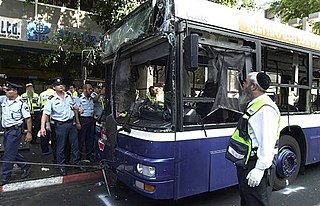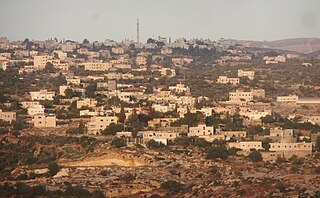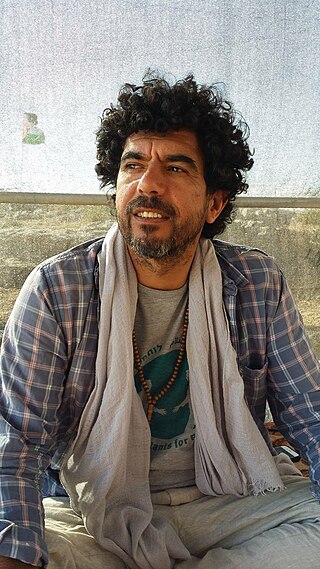Related Research Articles

The Second Intifada, also known as the Al-Aqsa Intifada, was a major Palestinian uprising against Israel. The general triggers for the unrest are speculated to have been centred on the failure of the 2000 Camp David Summit, which was expected to reach a final agreement on the Israeli–Palestinian peace process in July 2000. Outbreaks of violence began in September 2000, after Ariel Sharon, then the Israeli opposition leader, made a provocative visit to the Al-Aqsa compound on the Temple Mount in Jerusalem; the visit itself was peaceful, but, as anticipated, sparked protests and riots that Israeli police put down with rubber bullets and tear gas.
The International Solidarity Movement (ISM) is a Palestinian-led movement focused on assisting the Palestinian cause in the Israeli–Palestinian conflict. ISM is dedicated to the use of nonviolent protests and methods only. The organization calls on civilians from around the world to participate in acts of nonviolent protests against the Israeli military in the West Bank and the Gaza Strip.

Operation Defensive Shield was a 2002 Israeli military operation in the West Bank, carried out amidst the Second Intifada. Lasting for just over a month, it was the largest combat operation in the West Bank since the 1967 Arab–Israeli War, when Israel seized the territory from Jordan. Israel's stated goal for the escalation was to stop Palestinian terrorist attacks; the operation was launched two days after the Passover massacre, in which a Palestinian suicide bomber attacked the Park Hotel in Netanya, killing 30 civilians while injuring 140 more.
This page is a partial listing of incidents of violence in the Israeli-Palestinian conflict in 2005.

Breaking the Silence (BtS) is an Israeli non-governmental organization (NGO) established in 2004 by veterans of the Israel Defense Forces (IDF). It is intended to give serving and discharged Israeli personnel and reservists a means to confidentially recount their experiences in the Occupied Territories. Collections of such accounts have been published in order to educate the Israeli public about conditions in these areas.

Bil'in is a Palestinian village located in the Ramallah and al-Bireh Governorate, 12 kilometres (7.5 mi) west of the city of Ramallah in the central West Bank. According to the Palestinian Central Bureau of Statistics, Bil'in has a population of 1,800, mostly Muslims. In the 2000s, it was known for its regular protests against Israeli occupation.
The 2006 shelling of Beit Hanoun by the Israeli Defence Force (IDF) happened on 8 November, when shells hit a row of houses in the Gaza Strip town of Beit Hanoun, killing at least 19 Palestinians and wounding more than 40. The shelling followed the IDF's withdrawal from the Gaza Strip in completion of a week-long operation codenamed Operation "Autumn Clouds", which the Israeli government stated had been intended to stop the Qassam rocket attacks on Israel by Palestinian militants. The Israeli government apologized and attributed the incident to a technical malfunction.
Combatants for Peace is an Israeli-Palestinian NGO and an egalitarian, bi-national, grassroots movement committed to non-violent action against the “Israeli occupation and all forms of violence” in Israel and the Palestinian territories.
The following is a partial list of civilian casualties in the Second Intifada. According to the International Institute for Counter-Terrorism, 887 of the 1,137 Israelis killed in attacks from September 2000 – 2005 were civilians. Another 8,341 Israelis were wounded during this period, including 5,676 civilians and 2,665 security forces personnel. The majority of casualties were caused by suicide bombings, though Israelis have also been killed by planted bombs, shootings, stonings, stabbings, lynchings, rockets, and other methods of attack.

In 2008 the Israel Defense Forces launched Operation Hot Winter, also called Operation Warm Winter, in the Gaza Strip, starting on February 29, 2008 in response to Qassam rockets fired from the Strip by Hamas onto Israeli civilians. At least 112 Palestinian militants and civilians, along with three Israelis, were killed, and more than 150 Palestinians and seven Israelis were injured.

Yair Golan is an Israeli politician. He served as the Deputy Minister of Economy in the Thirty-sixth Israeli government, and served as a Member of the Knesset representing Meretz from 2019–2022. He is a reserved major general (Aluf) in the Israel Defense Forces. During his military service he served, among other roles, as the IDF Deputy Chief of Staff, Commander of the Home Front Command and Commander of the Northern Command.

Gush Etzion Junction("Tzomet HaGush") also known as Gush Junction is a 120-dunam business, commercial and tourism center in the southern West Bank, which serves as the entry point to the Gush Etzion bloc of settlements. It is administered by the Gush Etzion Regional Council.

Machsom Watch, or Checkpoint Watch, is a group of Israeli women who monitor and document the conduct of soldiers and policemen at checkpoints in the West Bank. Its members also observe and document the procedures in military courts, and aid Palestinians crossing through IDF checkpoints. The self described "politically pluralistic" human rights organization is composed entirely of Israeli women, who tend to have a "liberal or leftist background". The word machsom is Hebrew for "checkpoint," referring to Israeli Defense Forces checkpoints which control movement between different parts of the West Bank and between the West Bank and Israel.
Adam Keller is an Israeli peace activist who was among the founders of Gush Shalom, of which he is a spokesperson.

Events in the year 2014 in Israel.
The 2014 Alon Shvut stabbing attack occurred on 10 November 2014, when Palestinian Maher al-Hashlamun first attempted to run his vehicle into a crowd waiting at the bus/hitch-hiking station at the entrance to the Israeli settlement of Alon Shvut, in the Gush Etzion section of the occupied West Bank, then, when the car was stopped by a bollard, got out and attacked with a knife, killing a young woman and wounding two others. The attack occurred four hours after the killing of Sergeant Almog Shiloni in Tel Aviv and took place at the same bus/hitch-hiking stop where three Israeli teenagers were kidnapped and murdered in June 2014.
Sergeant Almog Shiloni of the Israel Defense Forces was killed on 10 November 2014 after he was stabbed multiple times at Tel Aviv HaHagana Railway Station. He died in hospital from his wounds. Shiloni was off-duty, but in uniform and armed at the time.
BOYCOTT! Supporting the Palestinian BDS Call from Within, commonly known as Boycott from Within, is an association of Jewish and Arab Israelis who support the Boycott, Divestment, and Sanctions (BDS) movement. Founded in 2008, it describes itself as following the guiding principles and sharing the goals of the Palestinian BDS movement, as delineated by Palestinian Campaign for the Academic and Cultural Boycott of Israel (PACBI).

Sulaiman Khatib is co-director and co-founder of Combatants for Peace, a bi-national, grassroots nonviolence movement in Israel and Palestine. Combatants for Peace is dedicated to three main pillars: nonviolent direct action, joint partnership between Israelis and Palestinians and ending the Israeli military occupation. Khatib was nominated, along with Israeli co-founder of Combatants for Peace, Chen Alon, for the Nobel Peace Prize in 2017 and 2018. He has been compared in the press to a modern-day Gandhi, Martin Luther King Jr. or Nelson Mandela. He cites these three nonviolence leaders as his personal inspiration and the key to his transformation from violence to nonviolence.
References
- 1 2 "Dr. Chen Alon, IL". Spot on Israel. 1969-04-20. Archived from the original on 2017-04-13. Retrieved 2017-04-17.
- ↑ "The Nobel Peace Prize Watch". Nobelwill.org. Retrieved 2017-04-17.
- 1 2 3 4 5 "Combatants for Peace | Chen Alon". Cfpeace.org. Retrieved 2017-04-17.
- ↑ "Soldiers who won't occupy". Theage.com.au. 2003-02-08. Retrieved 2017-04-17.
- ↑ "Chen Alon". The Forgiveness Project. Retrieved 2018-02-12.
- ↑ "Courage to Refuse - Press". www.seruv.org.il. Retrieved 2018-02-12.
- ↑ "Dr. Chen Alon | Tel Aviv University". English.tau.ac.il. 1980-01-01. Retrieved 2017-04-17.
- 1 2 "Chen Alon (Israel)". Forgiveness Project. 2010-05-26. Retrieved 2017-04-17.
- ↑ "Soldiers who won't occupy - theage.com.au". www.theage.com.au. 8 February 2003. Retrieved 2018-02-11.
- ↑ "About » Disturbing the Peace". disturbingthepeacefilm.com. Retrieved 2018-02-11.
- ↑ Allen, Nick. "Ebertfest 2016". www.rogerebert.com. Retrieved 2018-02-11.
- 1 2 3 "… about radical intimacy and missing visions". Theater Rote Rübe Leipzig. Retrieved 2018-02-11.
- 1 2 3 "Chen Alon - Theater Rote Rübe Leipzig". Theater-rote-ruebe.de. Retrieved 2017-04-17.
- 1 2 3 ""Rehearsing the revolution": theatre in Israel-Palestine". openDemocracy. 2015-03-13. Retrieved 2018-02-11.
- ↑ SocialTV (2013-01-16). "The Oppressed Theatre". YouTube . Retrieved 2018-02-11.
- ↑ "Chen Alon & The Polarised Theatre of the Oppressed". Cardboard Citizens. 2014-01-25. Retrieved 2017-04-17.
- ↑ Lee, Vered (2015-06-13). "All the Desert's a Stage for These Asylum Seekers". Haaretz. Retrieved 2018-02-11.